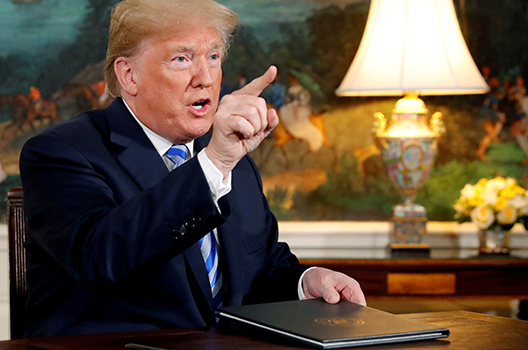 On Monday, US President Donald J. Trump signed an executive order detailing the framework for re-imposing sanctions on Iran, which were lifted under the JCPOA (Joint Comprehensive Plan of Action) nuclear deal, with the goal of getting Iran back to the table to negotiate a deal covering not just Iran’s nuclear weapons program, but also Tehran’s other malign activity. Immediately after issuing the order, Trump tweeted that these were the most biting sanctions ever and would be ratcheted up to another level in November. This is, of course, not true.
On Monday, US President Donald J. Trump signed an executive order detailing the framework for re-imposing sanctions on Iran, which were lifted under the JCPOA (Joint Comprehensive Plan of Action) nuclear deal, with the goal of getting Iran back to the table to negotiate a deal covering not just Iran’s nuclear weapons program, but also Tehran’s other malign activity. Immediately after issuing the order, Trump tweeted that these were the most biting sanctions ever and would be ratcheted up to another level in November. This is, of course, not true.
The sanctions the administration is re-imposing in two waves (August and November) on Iran are effectively the same sanctions that were in place in 2013 and led to the JCPOA negotiations. Unlike 2013, the Trump administration does not have the full support of the international community and is not bolstered by several United Nations Security Council resolutions imposing sanctions on Iran to generate maximum pressure on Tehran. Instead, the US withdrawal from the JCPOA has caused an ugly split with our European allies who passed a blocking regulation preventing EU companies from complying with US sanctions on Iran and has drawn the ire of the other deal signatories, China and Russia, and key partners–such as Turkey, India, Japan, and South Korea–who went along with US sanctions in 2013.
The EU blocking regulation will probably cause some headaches, especially for companies with a presence in both the United States and EU. At the end of the day, however, the blocking regulation is unlikely to be much more than a bargaining chip. The EU economy is too tightly intertwined with the US economy, particularly the dollar, to risk being cut off; Germany last week passed a law that could undercut the blocking regulation and allow German firms to avoid financial transfers that could trigger US sanctions.
Read the rest on the New Atlanticist blog.
Image: U.S. President Donald Trump speaks to reporters after signing a proclamation declaring his intention to withdraw from the JCPOA Iran nuclear agreement in the Diplomatic Room at the White House in Washington, U.S. May 8, 2018. (REUTERS/Jonathan Ernst/File Photo)
